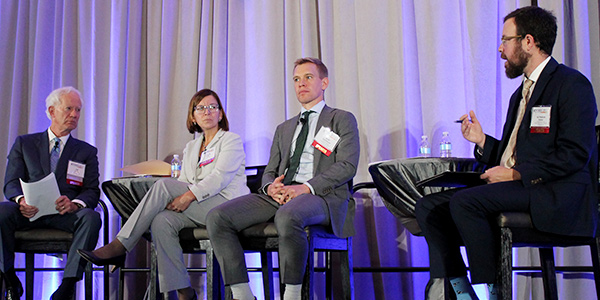By Michael Brooks
WASHINGTON — FERC observers have grown used to Commissioner Richard Glick criticizing his Republican colleagues at open meetings for not considering the downstream impacts of greenhouse gas emissions from the natural gas pipelines they approve.
In Glick’s view, Chairman Neil Chatterjee and Commissioner Bernard McNamee are simply ignoring the D.C. Circuit Court of Appeals’ August 2017 ruling in Sierra Club v. FERC (the “Sabal Trail” case), in which the court remanded the commission’s environmental impact statement on the Southeast Market Pipelines Project. The court ordered FERC to estimate the project’s impact on GHG emissions or explain more fully why it could not do so.
FERC ultimately chose to do the latter, arguing that it does not have sufficient information to determine the source of the gas being transported over pipelines, nor its end use. (See FERC Narrows GHG Review for Gas Pipelines.)

From left to right: Jay Costan, Dentons; Jamie Simler, Ameren; Matthew Christiansen, FERC; and Ari Peskoe, Harvard Law School. | © RTO Insider
And it is not legally obligated to seek out that information, Jay Costan, a partner at Dentons, argued at the Energy Bar Association’s Mid-Year Forum last week. He cited the Supreme Court’s 2004 ruling in Department of Transportation v. Public Citizen, which held that an agency has no obligation to gather or consider environmental information if it has no statutory authority to act on that information.
“To be clear, the statutory authority issue that’s involved here is not about what the pipeline does, but about the end use of the gas after the pipeline makes delivery,” Costan said during the conference’s opening panel Oct. 15. “Because the commission has no jurisdiction over end users or the end use of gas, the question becomes whether the commission can deny a pipeline certificate because it determines that the combustion of gas and the production of CO2 do not comport with the public convenience and necessity.”
Glick’s legal adviser, Matthew Christiansen, said that the court ruled in Sabal Trail that Public Citizen required FERC to do the analysis, as it knew that the pipeline in question would exclusively serve several natural gas plants in Florida.
Glick and Christiansen also argued in an article published in the Energy Law Journal, “FERC and Climate Change,” that “because 97% of natural gas is combusted, the emissions resulting from the combustion of natural gas will generally be a reasonably foreseeable result of a [Natural Gas Act] Section 7 certificate, even if the specific end-use consumer of the gas is not identified in the Section 7 proceeding.”
Even if FERC is not legally obligated to seek the downstream emissions data, it can and should still do so, Glick has argued. “The urgent threat of climate change does not necessitate a wholesale reinterpretation of the commission’s jurisdiction or a novel regulatory paradigm,” they wrote. “Instead, climate change increases the stakes of many commission actions, making it all the more important that the commission carry out its existing obligations.”
Question of Carbon Pricing
FERC will soon face new questions once NYISO files its proposal to price carbon into its markets.

Ari Peskoe, Harvard Law School | © RTO Insider
Panel moderator Ari Peskoe, director of Harvard Law School’s Electricity Law Initiative, wondered if FERC could rule the ISO expanded too far beyond its core mission if it starts pricing carbon. “Is this taking it just a step too far if you have the RTO deciding or just asking for permission to price carbon?” he asked.
“If the commission had to make a finding [under Section 206 of the Federal Power Act] that the markets are unjust and unreasonable because they don’t consider carbon or other environmental benefits, I think that would be a heavy lift,” Christiansen said.
But “because there are a range of reasonable results under Section 205 … if an RTO were to come and say, ‘Hey I want to do this for this reason and it has these market benefits,’ I could imagine that being the kind of thing that the commission could consider,” he said. “I guess what I would say is I don’t see [any reason] that once you put the word ‘CO2’ in the filing, it somehow dings it.”
“I think it’s a very interesting issue,” Costan said. “Most people’s normal expectation is that fees or taxes [or] charges on something like carbon are going to come from the legislature, either the federal legislature or the state legislature. And these proposals are unique in that there’s not explicit legislative mandate for the charge or the fee.”
NYISO, however, is developing its proposal with the New York Department of Public Service through the Integrating Public Policy Task Force. As ICF International has pointed out, “Unlike most U.S. regional transmission operators, NYISO encompasses only one state and is thus likely to have an easier path to such an outcome than an RTO covering many states with diverse policy agendas, such as PJM,” which is also studying carbon pricing.




